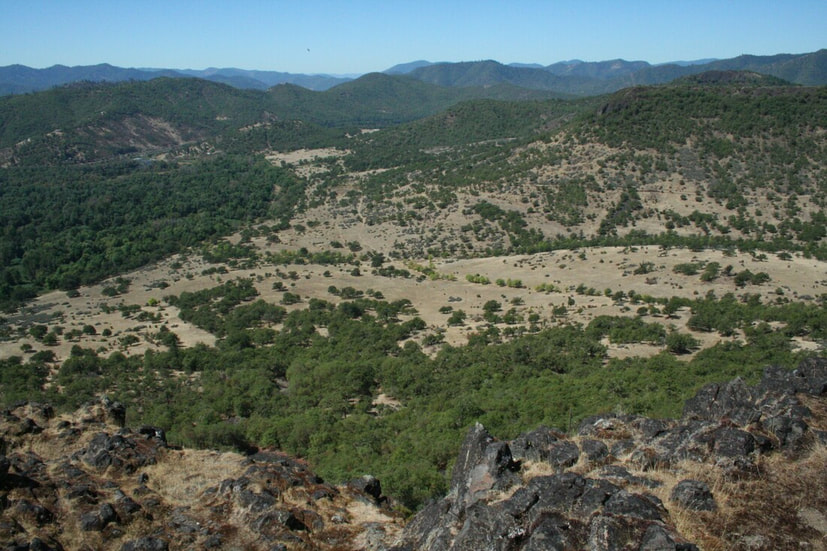2021 Outstanding Paper in Landscape Ecology Award
 Lead author Katherine Halstead
Lead author Katherine Halstead
Halstead et al.
The North American Chapter of the International Association of Landscape Ecology (IALE-NA) has selected a paper by Katherine Halstead and colleagues, published in the journal Landscape Ecology, as the recipient of the 2021 Outstanding Paper in Landscape Ecology Award. The Award will be given at the IALE-NA annual meeting, which is to be held virtually in April 2021. Members of IALE-NA are encouraged to nominate candidate papers on the topic of landscape ecology (published in any journal) and an Awards committee selects the winner.
Halstead et al.’s paper (“Using a species-centered approach to predict bird community responses to habitat fragmentation”) tests hypotheses about the relative influence of habitat amount, configuration and focal patch size on Oregon bird communities. The nominator for the award recognized the paper as outstanding for several reasons, one of which is the fact that it grapples with one of “the most salient and fundamental questions in landscape ecology and conservation science: the relative importance of habitat loss vs. fragmentation on species richness”. The work was carried out in the Rouge Basin watershed of the Klamath Mountains Ecoregion, and the nominator noted that the author’s “methodology is rigorous, innovative and powerful”.
Halstead is a MS alumna of the Betts Forest Landscape Ecology Lab at Oregon State University, led by Dr. Matt Betts. Three co-authors are in the same research group, including the PI, Dr. Betts. Halstead is currently a Research Biologist with the Klamath Bird Observatory (KBO) in Ashland, Oregon, along with two other co-authors.
After joining the Betts Lab in 2011, Kate became intrigued by the idea of using large datasets of bird observations in concert with cutting-edge modeling techniques and unclassified land cover to examine lingering questions in the field of landscape ecology. Regarding the resulting paper, she notes: “While complex, our species-centered methodology may provide a more accurate picture of the relationship of habitat composition and configuration with species richness. The power of our methods lies in their embrace of the complexity inherent in natural systems, providing insight into theoretical and applied questions alike in a way that is not possible using more traditional approaches.”
Matt Betts noted: “It is a tremendous honor for Kate’s paper to have been nominated, and selected for this award. Our hope is that the methods used in the paper can help the field of landscape ecology move toward a better understanding of fragmentation effects and community assembly, and ultimately more informed conservation decision making.”
John Alexander, KBO Executive Director, added: “This paper exemplifies the power of partnerships. The Betts Lab—KBO collaboration empowered Kate to use decades of bird monitoring data to fuel her state-of-the-art modeling approach and generate research outcomes that have profound potential to help address North America’s pervasive bird population declines. Now, Kate is working with natural resource managers to address the issues of habitat fragmentation and identify conservation opportunities in both eastern and western forests.”
For more information about the Betts Forest Landscape Ecology Lab, please visit http://www.fsl.orst.edu/flel/index.htm.
For more information about the Klamath Bird Observatory, please visit https://klamathbird.org.
Full reference: Halstead KE, Alexander JD, Hadley AS, Stephens JL, Yang ZQ, Betts MG (2019) Using a species-centered approach to predict bird community responses to habitat fragmentation. Landscape Ecology 34(8):1919-1935
The North American Chapter of the International Association of Landscape Ecology (IALE-NA) has selected a paper by Katherine Halstead and colleagues, published in the journal Landscape Ecology, as the recipient of the 2021 Outstanding Paper in Landscape Ecology Award. The Award will be given at the IALE-NA annual meeting, which is to be held virtually in April 2021. Members of IALE-NA are encouraged to nominate candidate papers on the topic of landscape ecology (published in any journal) and an Awards committee selects the winner.
Halstead et al.’s paper (“Using a species-centered approach to predict bird community responses to habitat fragmentation”) tests hypotheses about the relative influence of habitat amount, configuration and focal patch size on Oregon bird communities. The nominator for the award recognized the paper as outstanding for several reasons, one of which is the fact that it grapples with one of “the most salient and fundamental questions in landscape ecology and conservation science: the relative importance of habitat loss vs. fragmentation on species richness”. The work was carried out in the Rouge Basin watershed of the Klamath Mountains Ecoregion, and the nominator noted that the author’s “methodology is rigorous, innovative and powerful”.
Halstead is a MS alumna of the Betts Forest Landscape Ecology Lab at Oregon State University, led by Dr. Matt Betts. Three co-authors are in the same research group, including the PI, Dr. Betts. Halstead is currently a Research Biologist with the Klamath Bird Observatory (KBO) in Ashland, Oregon, along with two other co-authors.
After joining the Betts Lab in 2011, Kate became intrigued by the idea of using large datasets of bird observations in concert with cutting-edge modeling techniques and unclassified land cover to examine lingering questions in the field of landscape ecology. Regarding the resulting paper, she notes: “While complex, our species-centered methodology may provide a more accurate picture of the relationship of habitat composition and configuration with species richness. The power of our methods lies in their embrace of the complexity inherent in natural systems, providing insight into theoretical and applied questions alike in a way that is not possible using more traditional approaches.”
Matt Betts noted: “It is a tremendous honor for Kate’s paper to have been nominated, and selected for this award. Our hope is that the methods used in the paper can help the field of landscape ecology move toward a better understanding of fragmentation effects and community assembly, and ultimately more informed conservation decision making.”
John Alexander, KBO Executive Director, added: “This paper exemplifies the power of partnerships. The Betts Lab—KBO collaboration empowered Kate to use decades of bird monitoring data to fuel her state-of-the-art modeling approach and generate research outcomes that have profound potential to help address North America’s pervasive bird population declines. Now, Kate is working with natural resource managers to address the issues of habitat fragmentation and identify conservation opportunities in both eastern and western forests.”
For more information about the Betts Forest Landscape Ecology Lab, please visit http://www.fsl.orst.edu/flel/index.htm.
For more information about the Klamath Bird Observatory, please visit https://klamathbird.org.
Full reference: Halstead KE, Alexander JD, Hadley AS, Stephens JL, Yang ZQ, Betts MG (2019) Using a species-centered approach to predict bird community responses to habitat fragmentation. Landscape Ecology 34(8):1919-1935

